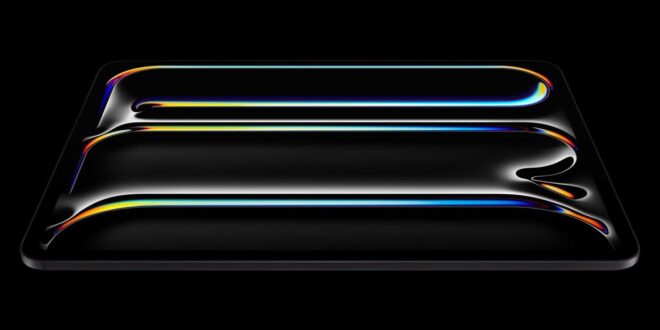Apple Inc unveiled a new artificial intelligence-focused iPad Pro and a larger iPad Air, aiming to reinvigorate a tablet lineup that has languished over the past two years.
At an online launch event on May 7 dubbed “Let Loose”, the company introduced the first redesigned version of the iPad Pro since 2018. The new model is thinner, includes a crisper Ultra Retina XDR screen with OLED technology, and has a faster M4 chip that can handle AI tasks. The new iPad Air looks like the prior version, but with a larger screen-size option and the M2 processor.
The new 13in iPad Pro has a depth of 5.1 millimeters, which the company said makes it the thinnest Apple product ever. The bigger version is a quarter-pound lighter than its predecessor, while the 11in model weighs under one pound.
The unveiling ends Apple’s longest drought in new iPad releases since co-founder Steve Jobs first introduced the device in 2010. The lineup was previously updated October 2022, when Apple added a faster chip to the iPad Pro and rolled out a redesigned low-end model.
Apple is looking to pull the iPad out of a severe slump. The device’s sales were particularly weak last quarter, when they plunged 17% and missed analysts’ estimates, but Apple predicted that iPad revenue would rebound in the current period.
Tuesday’s announcement didn’t do much to excite investors. That’s often the case with Apple events, since most of the key details get reported ahead of time. The shares were little changed at US$181.90 (RM863.52) as of 12.06pm in New York, leaving them down about 6% for the year.
The M4 chip, which replaces the M2 in the iPad Pro, is the latest installment in Apple’s homegrown processor line. The central processing unit is 50% faster than the one in the current iPad Pro, and the graphics engine is four times faster. The chip is built on second-generation 3-nanometer technology, Apple said.
The main improvement is the so-called neural engine, which the company says is 60 times faster than its original neural engine from 2017. That will help the iPad Pro handle AI tasks on the device itself. Apple plans to further discuss its artificial intelligence plans on June 10 as part of its Worldwide Developers Conference.
The iPad Pro’s OLED screen – short for organic light-emitting diode – means that colors are reproduced more accurately and appear more crisp. It’s the same underlying screen technology used in the iPhone and Apple Watch, but on a larger scale. Apple demonstrated how the screen can be far brighter than prior iPad displays and improves content that has a high dynamic range. For the first time, Apple is also offering a matte texture screen option for Pro users.
Now available in two sizes for the first time, the new iPad Air with M2 features improved performance, a landscape front-facing camera, and faster WiFi, along with support for Apple Pencil Pro. — Apple
Prior iPad Pros used Mini LED screens, a technology that created a blooming effect – light bleeding through in a way that can muddle an image. The new models come in space black and silver colours, the company said.
Even with sales declining the past two years, the iPad has remained the top-selling tablet globally. Nearly 10 million iPads were sold during the first quarter, according to research firm IDC, giving Apple a market share of 32%. Still, unit sales fell 9% since last year, IDC said. Samsung Electronics Co came in second, with 22% of the market. Huawei Technologies Co, Lenovo Group Ltd and Xiaomi Corp made up the rest of the top five.
Alongside the new hardware, Apple updated Final Cut Pro and Logic Pro for the iPad. It also launched a new app called Final Cut Camera to enable iPhones and iPads to provide additional camera angles during video shoots.
Both the new iPad Pro and iPad Air move the camera to the landscape side, responding to a frequent request from users.
Apple is attempting to squeeze more revenue out of the iPad line with the introduction of a pair of premium accessories. The new US$299 (RM1,419) and US$349 (RM1,656) Magic Keyboard – an iPad case with a built-in trackpad and keyboard – is now manufactured with a more durable aluminium material and makes the iPad look more laptop-like. A new US$129 (RM612) Apple Pencil Pro includes new gestures for artists.
The company didn’t update iPad mini on Tuesday, but it does plan to make changes to that product as early as the end of this year, Bloomberg News has reported.
Along with the improved specifications, the iPad has a heftier price tag. The 11in model now starts at US$999 (from RM5,299 in Malaysia), up from the prior model’s US$799 (RM3,793). The 13in model is US$1,299 (from RM6,799 in Malaysia) and up, an increase from a US$1,099 (RM5,217) starting price. That makes it Apple’s most expensive tablet yet.
All of the new iPads go on sale next week and are available to order Tuesday. The company also cut the price of the 10th-generation iPad to US$349 (RM1,656) and is discontinuing the US$329 (RM1,561) ninth-generation model.
The M2 chip in the updated iPad Air is coming to both the 11in model and new 13in version. That’s an upgrade in the M1 chip from 2022 and makes the tablet 50% faster, according to Apple. The 11in version continues to start at US$599 (from RM2,999 in Malaysia), while the 13in model is US$799 (from RM3,999 in Malaysia) – making it Apple’s cheapest tablet with a near laptop-sized screen.
Apple said it made the move to launch a bigger iPad Air after finding that about half of iPad Pro buyers chose the larger version of that model.
The new iPad Air comes in blue, starlight, silver and space gray, the company said. The iPad Air includes double the storage, starting at 128 gigabytes. It goes up to 1 terabyte. The iPad Pro starts with 256 gigabytes of storage, going up to 2 terabytes. – Bloomberg
 BeritaKini.biz Berita Viral Terkini di Malaysia
BeritaKini.biz Berita Viral Terkini di Malaysia





